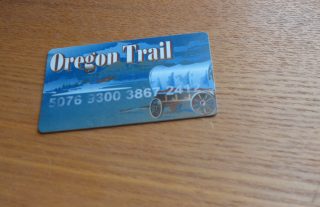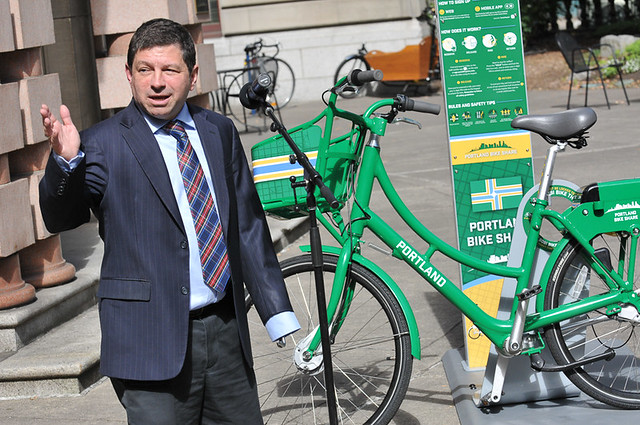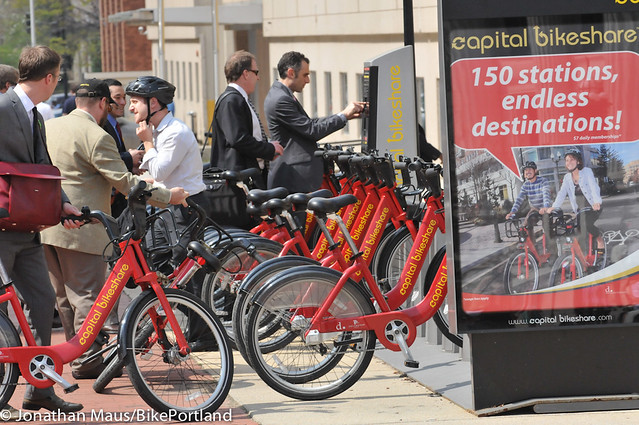
bike share system, even if no charge were made.
(Photo: M.Andersen/BikePortland)
Update 1:25 pm: This article was based on a Nov. 2 interview, but we didn’t check with the city again before publishing; we should have. Since Nov. 2, the city has done new research and is also speaking about the issues differently. We’ve changed the headline to reflect that. See the bottom of the post for more information.
Making bike-share systems useful to poorer people has been one of the thorniest problems in North American bike sharing.
One reason is probably that you need a credit or debit card to access most bike-share systems, and almost 20 percent of American households that earn less than $30,000 a year don’t have bank accounts. Another reason, presumably, is that bike share memberships cost upwards of $100 a year or (in Portland’s case) $2.50 per nonmember ride.
Bike sharing systems have tried to offset these problems by creating elaborate systems to allow cash purchases of memberships, or by discounting memberships to as little as $5 a year. The system Portland plans to launch next year is aiming to do both — though such programs have struggled to get more than several dozen eligible people to jump through the hoops and sign up.
If only huge numbers of poor Oregonians had already signed up for debit-type cards and carried them in their wallets everywhere they go.
As of 2014, 19 percent of Portland households use a personalized, government-issued electronic benefit transfer card to claim some sort of food stamp benefit, formally known by the acronym SNAP. Oregon’s food stamp program is one of the best in the nation at getting people to sign up; almost 100 percent of qualifying Oregonians have done so.
So what’s stopping Portland from offering free or deeply discounted bike-share memberships with a food stamp card?
Technical hurdles, but possible solutions

(Photos: J.Maus/BikePortland)
To be sure, there would be major technical hurdles. Modern bike-share systems rely on credit cards not just to make money but to track users’ identities, so they can be contacted and charged if a bike is lost or damaged.
Oregon’s SNAP program has a name and (usually) an address associated with all its recipients. Elliott McFadden, executive director for the bike share system in Austin, Texas, said in an interview that sharing SNAP recipient data among government agencies or with a city-chartered bike-share company might violate privacy rights. But Steve Hoyt-McBeth, who is overseeing Portland’s bike share contract as the city prepares its system, said there’d be a simple way around that: ask people explicitly to opt in.
“You have an [intergovernmental agreement] with the other agency, whether that’s a university or Human Health Services or Multnomah County, whoever that is, and you just try to provide a portal,” he said in an interview last month. “Once they agree to it … whatever instrument they’re already using, they can continue to use. Student card, EBT card.”
Advertisement
What about collecting money on a lost or damaged bike? A bike share system couldn’t exactly seize someone’s food stamp benefits if something goes wrong.
But that’s also a risk for cash systems like the one Portland is already planning to use, which will ask people to bring a mobile phone or paper printout to a local convenience store and pay cash there to get their bike-share membership. (Aaron Ritz, who works on a similar program for Philadelphia’s Indego system, said Wednesday that 280 people have bought a cash membership since the April launch, and 52 out of Indego’s 4,215 monthly members currently pay cash.)
In fact, anonymous rentals are already a risk with any credit-card-based system. If you want to trash or steal a bike-share bike, you can do so for the price of an anonymous VISA cash card from the grocery store. (With Portland’s system, theft will also require disabling a bike’s onboard GPS.)
The biggest problem with SNAP-card memberships isn’t that they wouldn’t work – it’s that they might
Hoyt-McBeth, the Portland bike share project manager, said that though the concept of offering bike-share memberships to SNAP households is “really interesting and exciting,” he didn’t expect the city to do so it also carries many challenges.
Even if the technical and policy problems could be solved, he said, a deeper one could arise: basic problem, a SNAP card program might be too successful at getting lots of poor people to use bike sharing.
“We can’t run a system based on people who can’t pay,” Hoyt-McBeth said. “They take that proverbial last bike, and then somebody with their juicy credit card comes up and wants to ride that bike for three hours on the waterfront.”
In North America, bike share systems are funded largely by that second person.
Hoyt-McBeth said Portland is pursuing other options like letting college students use bike sharing, in part because students’ memberships could be bundled into their school fees.
“Students would be a heck of a lot easier than people using SNAP,” he said.
Beyond that, he said, the most important thing Portland is trying to do to serve low-income people is “have a really simple, low-cost fare instrument” — $2.50 per ride.
If the city wants bike share to be helpful to large numbers of poor people, Hoyt-McBeth said, then taxpayers will have to pay for that. And for years, Portland’s city council has set a goal of not spending any local public money on bike share operations.
“We have public goals around financial sustainability and we also have goals around serving the public,” Hoyt-McBeth said. “And depending on what part of the public you’re in, those goals are either in conflict or not.”
Update 1:25 pm: Portland officials said Wednesday that despite the complexities of using food stamp cards as IDs, they have continued to research its feasibility.
“Issues of trying to integrate a food-stamp card are longer-term issues,” Hoyt-McBeth said. “We have not shut the door to that opportunity.”
“As we’ve indicated from the very beginning, we want to make bike share accessible to every person in Portland,” he said. “We are interested in working with people who are SNAP recipients. … There’s a lot to figure out in the technology and the level of partnership.”
“It’s not as simple as saying you just punch anything in and it works,” he said.
— Michael Andersen, (503) 333-7824 – michael@bikeportland.org


